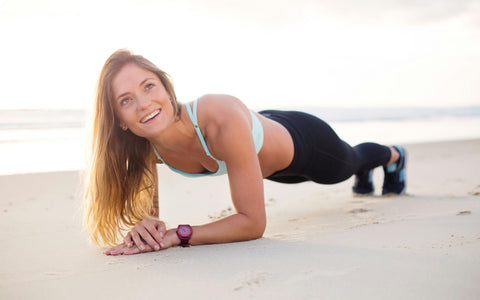Having a fast metabolism makes it far easier to burn calories more efficiently and maintain a healthy weight. Unfortunately, not all of us are gifted with a naturally fast metabolism, which can make it easier for our weight to creep up.
While regular workouts, eating healthy, and drinking plenty of water are important for improving your metabolic rate, certain gaps in your nutrition could be holding you back from pushing your body into a higher gear.
So in this post, we’re going to share the vitamins and minerals that will help fill those nutritional gaps to help you burn more calories and keep the weight off.
The 3 Vitamins That Can Help To Boost Your Metabolism
B Vitamins
Getting enough B vitamins ensures that the food we eat is used as an energy source and not stored in the body as fat, whether it’s healthy fats, carbohydrates or protein, B vitamins help metabolise all types of foods. Being deficient in this group of vitamins can disrupt the metabolism and cause you to pile on the pounds.
Recommended B vitamins intake
- B1/Thiamin: 1mg for men, 0.8mg for women
- B2/Riboflavin: 1.3mg for men, 1.1mg for women
- B3/Niacin: 16.5mg for men, 13.2mg for women
- B5/Pantothenic acid: No amount has been set in the UK
- B6: 1.4mg a day for men, 1.2mg a day for women
- B7/Biotin: 30mcg a day for men and women
- B9/Folate acid: 200mcg for men and women
- B9: 200mcg for men and women, 400mcg up to 12 weeks pregnant
- B12: 1.5mcg for men and women
Foods and supplements containing B vitamins

Foods that are rich in B vitamins include lean meats, whole grains, green leafy veg, beans, nuts, and seeds. If you’re vegan, getting enough B12 from your diet is going to be tricky as it’s only found in meat, fish, eggs, dairy and some fortified soy products. That’s why we have a fantastic range of B12 products to give vegans the same chance to fill nutritional gaps and rev up your metabolic rate. You can choose from our delicious drinks, tablets or spray which is ideal for when you’re on the go.
Vitamin C
When you’re under a lot of stress, the body uses up a lot of vitamin C and a number of stress hormones are released, including cortisol. This hormone sends your body into fight, or flight mode, temporarily pausing regular bodily functions and slowing down your metabolism, leading to weight gain. The release of cortisol can also increase your appetite, making you crave your favourite junk foods, and indulging a bit too much will inevitably lead to weight gain.
To combat stress and prevent your metabolism from slowing down, add more vitamin C to your diet.
Recommended vitamin C intake
Adults aged 19 to 64 should aim to get 40mg of vitamin C daily.
Foods and supplements containing vitamin C
Fruit and veg are your best friends when it comes to getting enough vit C. Fresh or frozen berries, citrus fruit and broccoli pack the biggest nutritional punch. For a deliciously easy win, throw it all into a smoothie and retain some of that gut-loving fibre as well.
If you want to make things even simpler, give our vit C products a try. Our sparkling orange drinks are perfect when you’re out and about. We also have tablets which will help you maintain the same vit C levels every day.
Vitamin D
While there’s not much research to suggest vitamin D has a direct impact on your metabolism, low levels of vit D may influence your body in other ways.
Research from Newcastle University found that a deficiency in vitamin D can lead to low energy levels and muscle fatigue. This can reduce your motivation to workout or stick to your weight loss routine, which will have an effect on your metabolism over time. So it’s essential you get enough vit D to feel strong and energised.
Recommended vitamin D intake
Adults should be consuming 10 micrograms of vitamin D daily.
Foods and supplements containing vitamin D

The most effective way to get more vit D is through direct exposure of your skin to sunlight, but these days, with worries about sun exposure and the use of high factor sunscreen, it's unlikely you're going to be able to get enough, especially during the winter.
You can get some vit D from the right foods, including fatty fish (salmon, mackerel, and sardines), dairy products (eggs and milk), and mushrooms. However, it's impossible to get the levels of vit D through food alone. So while you can try to get more sunlight and eat vit D rich foods, we recommend year-round supplementation to ensure you keep topped up.
Our tasty and best-selling Mango & Passionfruit drink, effervescent tablets, regular tablets and spray will give you the helping hand you deserve.
The 3 Minerals That Can Help To Boost Your Metabolism
Iron
When it comes to revving up your metabolism, iron cannot be ignored. Having low iron levels in the blood means there will be less oxygen transported to your muscles. This will hinder the fat burning process and interfere with your metabolic rate.
Recommended Iron intake
Men aged 18 or over should be getting 8.7mg of iron daily. Women aged between 19-50 should be getting 14.8mg daily and women aged 50 and over need less at 8.7mg.
Foods and supplements containing Iron

It’s relatively easy to get enough iron from red meat, liver, mixed beans, nuts, dried fruit, and some fortified breakfast cereals. We also have a Multivits + Iron supplement that contains 14mg of iron, handy when you’re travelling or unable to eat enough iron rich foods.
Magnesium
Our bodies are heavily reliant on having the right levels of magnesium to ensure that the chemical reactions taking place are helping our bodies produce energy. If we’re deficient, our metabolism and the process of energy production slows down.
Recommended Magnesium intake
A healthy intake for men aged 19-64 is 300mg daily. Women the same age need slightly less at 270mg.
Foods and supplements containing Magnesium
You can get your daily dose of magnesium from green leafy vegetables, wholegrains, avocados, oily fish, beans, lentils, nuts & seeds and the best one - dark chocolate!
Calcium
Calcium provides a small increase in thermogenesis, which is our body's core temperature. This may boost our metabolism, helping our bodies to burn more fat.
A study compared 63 overweight women undergoing a 15-week weight loss programme. The study found that the women who took 600mg of calcium twice a day saw a significant decrease in fat mass and body weight compared to those who didn’t. So for those looking to burn a few extra pounds and improve their metabolism, adding more calcium to your diet may be the missing piece of the puzzle.
Recommended Calcium intake
Adults should be getting 700mg of calcium daily.
Foods and supplements containing Calcium
While it’s easy to rely on a calcium supplement, food should always come first, and we recommend that at least half of your calcium intake should come from your diet.
You can get plenty of calcium from dairy products (milk, yoghurt and cheese), but be careful if you’re lactose intolerant. You can also get calcium from soybeans, dark leafy veg, broccoli, orange juice, fortified cereals and even the all-time classic - baked beans.
Summary
Having a slow metabolism can feel like a lifetime battle, making us prone to putting on the pounds and feeling the pressure about what we’re eating.
We don’t want you to feel that way, and with the right vitamins and minerals, you could be filling the nutritional gaps in your diet which could make a whole load of difference to switch your metabolism into a higher gear to help you burn more fat.
The 3 vitamins that can help boost your metabolism are: vitamin B, vitamin C and vitamin D.
The 3 minerals that can help boost your metabolism are: iron, magnesium and calcium.
Remember that fitness and weight loss is not a sprint and can be a bit of a marathon, so take it slow and you’re more likely to achieve consistent results. If you have any concerns about your health and diet, check in with your GP, and for any product enquiries, email one of our team members and we’ll be more than happy to help @hello@getmorevits.com.
Ready for your next read? Check out our interesting blog, where we explain why humans can’t produce vitamin C.

